Dawid Krawczyk: You produced a biopic on Julian Assange, Risk (directed by Laura Poitras). And to say the least, it’s definitely not hagiographical of the Wikileaks founder.
Yoni Golijov: That is for audiences to decide. Of course, I hope it provides a realistic and accurate portrait of Assange. We see his historic, ground-breaking publishing, for example: the State Department Leaks, especially at the beginning. But in addition to his brilliant work, we also see other sides, including ego and narcissism, abuse of power and sexist attitudes.
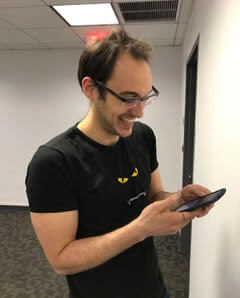
At the end of the film, it ends on a note… Let’s just say that Assange did not like the final version of the film. We felt that the film was true, and it is our responsibility as journalists, as artist, and filmmakers to create something we believe in.
Before Risk I saw CITIZENFOUR – an amazing documentary on Edward Snowden shot and edited in a similar cinéma vérité style. It won an Oscar for Best Documentary Feature. And in Risk, we learn that CITIZENFOUR was an unplanned development while Laura Poitras was working on this movie about Assange.
When Wikileaks published the Iraq War Logs, Afghan War Diaries, and in particular the Collateral Murder video, Laura immediately wanted to make a film about the people who were doing this kind of journalism that we weren’t getting but we needed, especially in the US. She saw those wars, she had been to Iraq and filmed a documentary, My Country, My Country. When WikiLeaks published Collateral Murder, Laura was immediately drawn to them. In 2011 she started filming with Assange and Wikileaks, and only later did Snowden contact her.
When she started filming with Snowden, at that time, she still thought she was doing one movie, about Wikileaks, Assange, Snowden, other whistleblowers and journalists. But during editing it became obvious that the shoot in Hong Kong with Snowden changed things into a whole new creature. At that point, they realized that they had two films.
They are quite similar though, especially aesthetically. There is this scene…
The scene in which Assange disguises himself and puts on contacts? That was a crazy occurrence, who could have predicted that would happen once, let alone twice, during Laura’s filming.
I just want to make sure, Snowden didn’t know about the ongoing documentary about Assange and vice versa, right?
Totally. It’s security question. When Laura was first contacted by Snowden she thought it was an elaborate trap. The CIA wants to get Assange, the FBI wants to get Assange, and they can’t get him directly, so – she thought – they’re trying to get him through other people. Through her or through a film crew member. She was very suspicious. The timing was incredible, you have to agree. She was already speaking with one of the most surveilled people in the world and now someone new she’s never heard of reaches out. There is actually a scene in the film, Assange is looking out at the ocean, and Laura discusses how you have to adopt intelligence agency tactics for this kind of journalism. Because states are so intent on not allowing journalistic freedom and coming after your source.
Back to your question, Assange found out about Snowden like the rest of the world did, when Laura started reporting from Hong Kong. And then Sarah Harrison [a WikiLeaks editor] was very courageous and flew to Hong Kong to meet with Snowden and get him out of there.
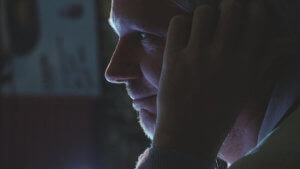
Laura got in contact with Wikileaks and whistleblowers because of her war experience. How did you started working with Laura?
I was a huge fan of her work. I first worked with Laura slightly on a film she did in Beijing documenting Ai Weiwei, and then our first big project together was her solo museum show, Astro Noise, and the accompanying book, Astro Noise: A Survival Guide for Living Under Total Surveillance.
Do you still remember how you learned about Wikileaks?
Absolutely. I actually remember very clearly the Iraq War Logs and The State Department leaks. They were incredible. At the time I was studying at Columbia University and the Head of The School International and Public Affairs sent an email out to students saying that they should not read the leaks because it would harm their chances of working for the government in the future.
So, basically, they warned you to not even to read the leaks. Sounds like a strong reaction.
It was hidden behind a technical argument in a certain sense. When you work for the government, if you read something without being cleared then you can’t get clearance in the future. Eventually because of heavy criticism, the school had to take a step back and say ‘we are not saying you can’t read them, we are just recommending you might not want to for your future career prospects.’ I remember that clearly, it was so controversial.
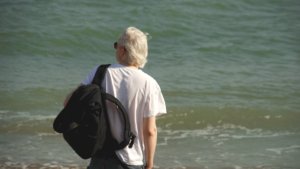
We tend to think about Snowden’s revelations or Chelsea Manning’s leaks as groundbreaking moments of contemporary political history or at least American political history. But did they really have such huge political impact? Isn’t it hard to point to a lasting political consequence of whistleblowers’ actions today?
I think there are particular things that their actions impacted, for example, our knowledge of the death count in Iraq. I think the first time we had an accurate picture of what it really was was after the Iraq War Logs. Suddenly we had a more accurate picture of the dead than what the government was telling us publicly. In terms of having an effect on political consequences, I think we have to have a more nuanced understanding of how reporting, in general, affects politics. It’s not usually direct.
And we need to remember the context of those leaks. It was 2010 and by that point the anti-war movement had basically demobilized because it had seen electing Obama as the goal. Obama was supposed to end the wars. What he did though, was to increase the number of troops in Afghanistan. The troop surge and then the leaks gave new energy to the movement and critical journalism about the wars.
And the political context was quite different. Assange was basically a hero for progressive activists and pundits, whereas some Republicans and even Donald Trump himself called for assassinating Assange on Fox News. I have a quote for you, not from 2010, but from 2017. “I used to think he was a traitor and a puppet (…) And as time has gone on I have to come to view him as something of a hero.” Do you know who said that?
Trump?
You’re almost right. It’s Milo Yiannopoulos, the alt-right celebrity. So, what changed exactly? Because something had to change if the same people who called for an extrajudicial killing of Assange are now portraying him as a hero?
A lot has changed, and a lot has stayed the same, right? Haha.
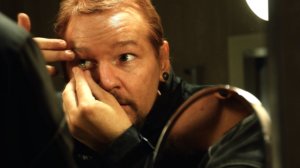
Let me be more specific, then. Did Assange change over the years?
When he was publishing the Iraq War Logs and the State Department Cables, he worked with the mainstream media, huge newspapers like The New York Times, to select and redact the content. They went through a traditional journalistic process.
But then the State Department cables were leaked by a third party, so WikiLeaks decided to publish all the cables on their website, without redactions, and in response, the newspapers said they couldn’t work with WikiLeaks. That might have in some ways pushed Wikileaks into a corner. In fact, there’s a line at the beginning of the film where he says this is what happens when you push people into the corner. And then that became the model for the following publications: publishing full data assets without redactions.
And personally, how did he change? You had access to hours of footage from his everyday life. By the way, how many hours did Laura record?
I don’t know the exact number. It was two years of intensive filming, and then there’s archival, audio, etc. So, lots of footage.
He’s been in the embassy for five years. That has to be a very difficult situation to be in. It is not healthy. I can’t imagine trying to live that way. At the same time, he has the power to affect world politics from his computer, from one of the most surveilled points in the world.
Assange is not the only part of the puzzle that changed. It’s like progressives and conservatives switched sides when it comes to Wikileaks.
Sean Hannity of Fox News used to criticize him and now he interviews him on his show. Why? The simplistic answer would be that they support him when he publishes something that supports their political position and criticize him when he does the opposite. A more complex answer might be to examine the risks of a malleable “anti-establishment” politics that does not put Left-wing principles at its core. That said, if Assange had document leaks that lend themselves to criticism of Trump or of the Republican Party I think he would publish them.
We often forget that he didn’t immediately lose favour with progressives in 2016. First, he published the Democratic National Committee exposing the DNC’s efforts to suppress Sanders’ campaign. At that point it was in a way similar to what happened around the Afghanistan war where the establishment Democratic party was against him, but progressives and Left-wing radicals were supportive of him.
But then a few months later he started publishing the Podesta emails. Liberals, progressives, and sections of the Left, were upset by that. And he actually gained support on the Right.
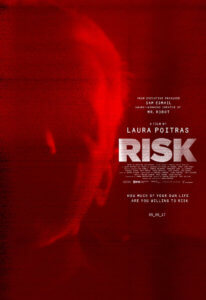
It’s not only that he gains support. Today, his critics point out that he has ambitions to support the supposed anti-establishment efforts of the right. Advising Donald Trump Junior on Twitter, come on, that was too much and not only for the radical left.
Yes. If we look at the tweets between him and Donald Trump Junior, from what we’ve seen so far they don’t reveal any grand conspiracy, but they do reveal that he was not engaging in a typical journalist’s discussion with a source or subject saying “I am going to publish – do you have any comment?” He was suggesting things like questioning the result of the election. In my view, that is a completely unethical thing for journalists to do, or to engage in.
The issue that I think you touched on is very important and it is complicated. How much is he playing into the Right-wing’s narratives? Look at the Seth Rich murder conspiracy for example. WikiLeaks played into the narratives of the right. That’s not only politically dangerous, it’s also hurtful to Seth Rich’s family. I think journalists shouldn’t play into these conspiracy theories. If they have evidence, or new reporting based on journalistic investigations, that’s different. But that’s not what he was doing there. So I think that there could be an element where Assange is looking for allies and supporters and going to where he sees those now, which is on the Right.
Risk is a documentary, not a thriller. So its lack of a clear conclusion is not such a big problem. But if it was some cyberpunk spy thriller how would you imagine the conclusion of Wikileaks’ and Julian Assange’s story?
It is always good to have a cliffhanger, isn’t it? Let me give you some background on how we worked on Risk. In the middle of one of our last sound mixing sessions, the CIA director goes on the news and declares Wikileaks a hostile non-state intelligence agency. The Attorney General implies they want to arrest Assange. But we have a release date, we have theaters booked, so we can’t just wait and see. Wikileaks has had an enormously powerful effect on journalism as a whole, I think. Now, many newsrooms have set up tools to receive anonymous leaks such as Secure Drop. They are following in Wikileaks’ footsteps. Secure Drop itself was designed by Aaron Schwartz, but the method and model was in large part pioneered by Wikileaks. So that should be a part of the conclusion, the effect they’ve had on journalism.
People should keep making films about Assange because there is more. We just don’t know what will happen over the next five years, ten years, thirty years. How much longer will he be in the embassy? Will they keep receiving leaks? Will they keep publishing?
Yoni, you know that the question about the conclusion to this cyberpunk spy thriller is only thinly disguised invitation to speculate on Assange’s future, right?
Haha, I hear you, but that is one invitation I will have to decline. Assange has been there for five years now, in the embassy. My understanding is that he is still subject to arrest by the British Police for breaking bail when he entered the embassy, but would only face one year in prison for that. Does he walk out and get arrested? And then what? Or does he go out and go free? Does he wait there for five, ten, twenty years? Or does he escape somehow? He has definitely proven that all of these are hypotheses we should entertain.
![Political Critique [DISCONTINUED]](http://politicalcritique.org/wp-content/uploads/2015/09/Political-Critique-LOGO.png)
![Political Critique [DISCONTINUED]](http://politicalcritique.org/wp-content/uploads/2015/09/Political-Critique-LOGO-2.png)
And any number of countries have the technology to take these persons down — if they wanted to. So that, then, the “want to” part, ought to be the focus of this mess. Why do governments with the ability to erase these thugs put up with them? Inquiring minds want to know…